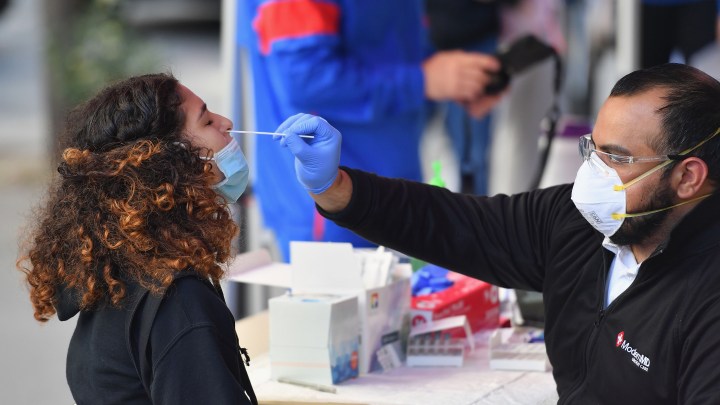
Why having a job makes it more likely you have health insurance
Why having a job makes it more likely you have health insurance

It’s that time of year where people are shopping around for health insurance plans. That can mean looking at the health care marketplaces or assessing Medicare plans. Or looking at the options an employer provides during open enrollment season. About half of Americans get their insurance through an employer — but why?
“The story that you most often hear is that employers were offering fringe benefits,” said Christy Chapin, a history professor at the University of Maryland, Baltimore County.
During World War II, amid stiff competition for employees, benefits were a valuable recruiting tool, due to a federally imposed wage cap. “That story is almost right but not quite really, the most important factor for the reason we receive our health care benefits through our employers is the tax write-off,” she said.
Chapin said businesses liked that tax write-off and offering health insurance was a strategy to hopefully keep employees. “They are thinking if they are providing health care benefits to their employees, their employees will be more loyal to them than to the unions,” said Chapin.
In the years after World War II, employee-based health insurance became the norm as medical care expanded, consumer spending boomed and payrolls swelled with workers who enrolled to get their “fringe benefit.” Left out? Black workers, who were discriminated against in the job market, unmarried women and small business owners.
Meanwhile, Europe’s post-war economies were devastated, according to Aaron Carroll, a health services researcher at Indiana University’s School of Medicine.
“The idea that the private sector was going to take care of the health care system was not going to happen, which is why so many public systems arose there. And we came out of it with a very different health care system that was built and operates very differently. But that’s not because of the founders. And it’s not because of the Constitution or America. It’s a quirk of history and then IRS policy,” he said.
Eventually, the U.S. did establish Medicare for older Americans and Medicaid for Americans with disabilities or limited incomes. Carroll said that still left much of the population dependent on a system built for a very different type of workforce.
“The idea that you would take a job and stay with it for four decades is an old idea,” he said.
And all along, health care costs kept rising.
In 2010, President Barack Obama signed the Affordable Care Act into law. One of the ACA’s goals was to relieve “job lock” so people don’t feel tethered to an employer just for the health insurance. “People can’t take that kind of gig economy-type job without being able to have some other way to get health insurance,” said Cynthia Cox with the Kaiser Family Foundation.
The ACA was written assuming most people would get insured through their employer. But in the last eight months, 7.7 million people have lost jobs — and including family members, that may be 14 million more people now without employer-based insurance.
“This will be the first true test of whether the ACA works as a safety net for people who lose employer coverage,” Cox said.
There’s a lot happening in the world. Through it all, Marketplace is here for you.
You rely on Marketplace to break down the world’s events and tell you how it affects you in a fact-based, approachable way. We rely on your financial support to keep making that possible.
Your donation today powers the independent journalism that you rely on. For just $5/month, you can help sustain Marketplace so we can keep reporting on the things that matter to you.


















